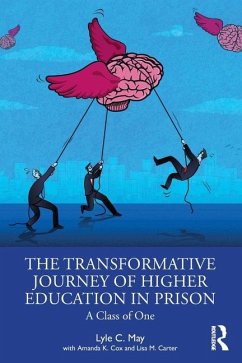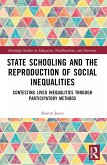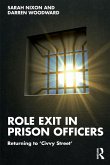Lyle C. May, Amanda K. Cox, Lisa M. Carter (Florida Southern College, Lakeland, USA)
The Transformative Journey of Higher Education in Prison
A Class of One
Lyle C. May, Amanda K. Cox, Lisa M. Carter (Florida Southern College, Lakeland, USA)
The Transformative Journey of Higher Education in Prison
A Class of One
- Broschiertes Buch
- Merkliste
- Auf die Merkliste
- Bewerten Bewerten
- Teilen
- Produkt teilen
- Produkterinnerung
- Produkterinnerung
This volume follows one manâ s revolutionary journey from deficient early education to his incarceration on North Carolinaâ s death row, where he was given the opportunity to pursue higher education.
Andere Kunden interessierten sich auch für
![Race, Racism, and Higher Education Race, Racism, and Higher Education]() Kalwant Bhopal (UK University of Birmingham)Race, Racism, and Higher Education54,99 €
Kalwant Bhopal (UK University of Birmingham)Race, Racism, and Higher Education54,99 €![State Schooling and the Reproduction of Social Inequalities State Schooling and the Reproduction of Social Inequalities]() Sharon Jones (UK Anglia Ruskin University)State Schooling and the Reproduction of Social Inequalities56,99 €
Sharon Jones (UK Anglia Ruskin University)State Schooling and the Reproduction of Social Inequalities56,99 €![Affirmative Action and Black Student Success Affirmative Action and Black Student Success]() David J. LukeAffirmative Action and Black Student Success55,99 €
David J. LukeAffirmative Action and Black Student Success55,99 €![Handbook of Educational Psychology Handbook of Educational Psychology]() Handbook of Educational Psychology106,99 €
Handbook of Educational Psychology106,99 €![Student Engagement, Higher Education, and Social Justice Student Engagement, Higher Education, and Social Justice]() Corinna BramleyStudent Engagement, Higher Education, and Social Justice37,99 €
Corinna BramleyStudent Engagement, Higher Education, and Social Justice37,99 €![Role Exit in Prison Officers Role Exit in Prison Officers]() Sarah NixonRole Exit in Prison Officers56,99 €
Sarah NixonRole Exit in Prison Officers56,99 €![Impacts of COVID-19 on International Students and the Future of Student Mobility Impacts of COVID-19 on International Students and the Future of Student Mobility]() Impacts of COVID-19 on International Students and the Future of Student Mobility42,99 €
Impacts of COVID-19 on International Students and the Future of Student Mobility42,99 €-
-
-
This volume follows one manâ s revolutionary journey from deficient early education to his incarceration on North Carolinaâ s death row, where he was given the opportunity to pursue higher education.
Hinweis: Dieser Artikel kann nur an eine deutsche Lieferadresse ausgeliefert werden.
Hinweis: Dieser Artikel kann nur an eine deutsche Lieferadresse ausgeliefert werden.
Produktdetails
- Produktdetails
- Verlag: Taylor & Francis Ltd
- Seitenzahl: 134
- Erscheinungstermin: 30. August 2024
- Englisch
- Abmessung: 228mm x 152mm x 10mm
- Gewicht: 222g
- ISBN-13: 9781032582870
- ISBN-10: 1032582871
- Artikelnr.: 70243089
- Herstellerkennzeichnung
- Libri GmbH
- Europaallee 1
- 36244 Bad Hersfeld
- gpsr@libri.de
- Verlag: Taylor & Francis Ltd
- Seitenzahl: 134
- Erscheinungstermin: 30. August 2024
- Englisch
- Abmessung: 228mm x 152mm x 10mm
- Gewicht: 222g
- ISBN-13: 9781032582870
- ISBN-10: 1032582871
- Artikelnr.: 70243089
- Herstellerkennzeichnung
- Libri GmbH
- Europaallee 1
- 36244 Bad Hersfeld
- gpsr@libri.de
Lyle C. May is an Ohio University alum, member of the Alpha Sigma Lambda Honor Society, incarcerated journalist, advocate for higher education, and activist. He recently published the book Witness: An Insider's Narrative of the Carceral State. Amanda K. Cox is an Associate Professor of Instruction in the Department of Sociology and Anthropology at Ohio University and is an affiliate of the university's Center for Law, Justice, and Culture. She was a recipient of the Dr. Eric A. Wagner Endowed Professorship and Ohio University Honors Tutorial College Distinguished Mentor Award in 2022. She teaches undergraduate and graduate courses in sociology and criminology, taking a sociological approach to the study of criminological theory, the death penalty, ethics in law and justice, and crime and media. Dr. Cox's research interests include the death penalty, racial and socioeconomic inequality in punishment, ethics in law and justice, and criminological theory. Her research has been published in several academic journals. Lisa M. Carter is an Associate Professor of Criminology at Florida Southern College. She also teaches courses for the Women and Gender Studies program. She earned her B.A in Sociology from the University of Kentucky, and her M.S. in Corrections and Juvenile Justice Studies from Eastern Kentucky University. She completed her Ph.D. in Criminology at Indiana University of Pennsylvania. Her research interests include female criminality, corrections and rehabilitation, reintegration, and death penalty issues. She is the co-editor of the books, Female Offenders and Reentry: Pathways and Barriers to Returning to Society and Punishing Gender Past and Present: Examining the Criminal Justice System across Gendered Experiences. Dr. Carter co-authored the second edition of The Decision-Making Network. Additionally, she has published in Corrections: Policy, Practice, and Research, Violence and Victims, and Journal of Homosexuality. She holds professional memberships with the Academy of Criminal Justice Sciences, American Society of Criminology, and Southwestern Social Sciences Association. She is a supporter of the Pennsylvania Prison Society and Pace Center for Girls. The Transformative
Acknowledgments
Foreword
PART 1: The School-to-Prison Pipeline
1 Dysfunctional Learning
2 Institutional Learning
3 Class Dismissed
PART 2: Moral Panic: Abandoning the Rehabilitative Ideal
4 Uneducated
5 The Opportunity
6 Returning to the Classroom
PART 3: The Intrinsic Value of Higher Education: Resilience and Resistance
7 Choosing Higher Education
8 Class of One
9 Associate Degree
PART 4: Convict Criminology, Penal Populism, and Why Restoring the
Rehabilitative Ideal In Prison Is Not As Simple As the Return of Pell Grant
Access
10 Programs
11 Cultural Shift
12 Learning Environment
13 Challenging the Narrative
14 Networking
Epilogue
Afterword
Index
Foreword
PART 1: The School-to-Prison Pipeline
1 Dysfunctional Learning
2 Institutional Learning
3 Class Dismissed
PART 2: Moral Panic: Abandoning the Rehabilitative Ideal
4 Uneducated
5 The Opportunity
6 Returning to the Classroom
PART 3: The Intrinsic Value of Higher Education: Resilience and Resistance
7 Choosing Higher Education
8 Class of One
9 Associate Degree
PART 4: Convict Criminology, Penal Populism, and Why Restoring the
Rehabilitative Ideal In Prison Is Not As Simple As the Return of Pell Grant
Access
10 Programs
11 Cultural Shift
12 Learning Environment
13 Challenging the Narrative
14 Networking
Epilogue
Afterword
Index
Acknowledgments
Foreword
PART 1: The School-to-Prison Pipeline
1 Dysfunctional Learning
2 Institutional Learning
3 Class Dismissed
PART 2: Moral Panic: Abandoning the Rehabilitative Ideal
4 Uneducated
5 The Opportunity
6 Returning to the Classroom
PART 3: The Intrinsic Value of Higher Education: Resilience and Resistance
7 Choosing Higher Education
8 Class of One
9 Associate Degree
PART 4: Convict Criminology, Penal Populism, and Why Restoring the
Rehabilitative Ideal In Prison Is Not As Simple As the Return of Pell Grant
Access
10 Programs
11 Cultural Shift
12 Learning Environment
13 Challenging the Narrative
14 Networking
Epilogue
Afterword
Index
Foreword
PART 1: The School-to-Prison Pipeline
1 Dysfunctional Learning
2 Institutional Learning
3 Class Dismissed
PART 2: Moral Panic: Abandoning the Rehabilitative Ideal
4 Uneducated
5 The Opportunity
6 Returning to the Classroom
PART 3: The Intrinsic Value of Higher Education: Resilience and Resistance
7 Choosing Higher Education
8 Class of One
9 Associate Degree
PART 4: Convict Criminology, Penal Populism, and Why Restoring the
Rehabilitative Ideal In Prison Is Not As Simple As the Return of Pell Grant
Access
10 Programs
11 Cultural Shift
12 Learning Environment
13 Challenging the Narrative
14 Networking
Epilogue
Afterword
Index








